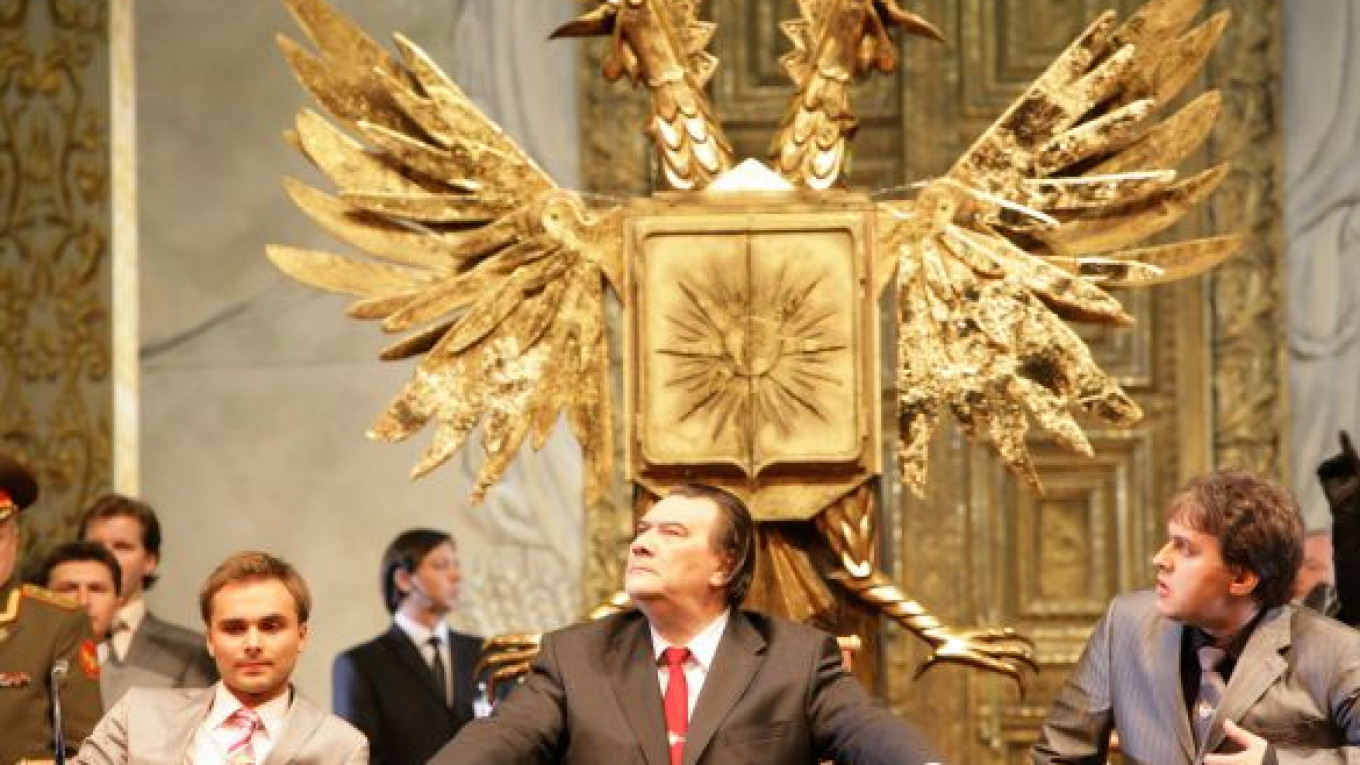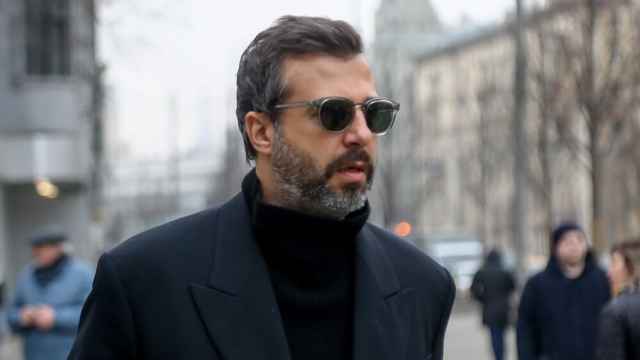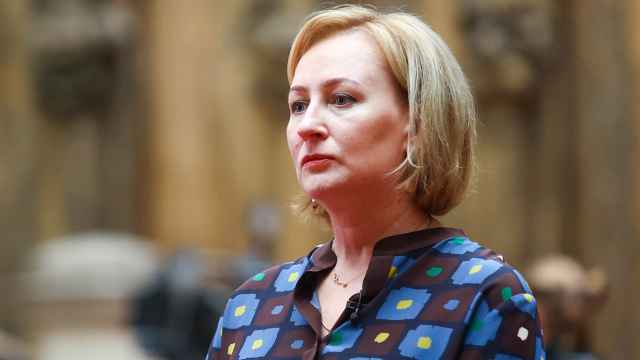For the last premiere on the Bolshoi’s New Stage before the long-awaited opening of its main stage at the end of this month, the company has pulled out all the stops, with a lavish, garish and thoroughly exhilarating production of Nikolai Rimsky-Korsakov’s final opera, “The Golden Cockerel.” The production, by theater and film director Kirill Serebrennikov, is one of the most visually impressive productions to be mounted at the Bolshoi for years, and with its mix of sharp political satire and sumptuous set pieces it will surely prove a hit if the theater decides to send it on tour to the West.
The curtain opens on an ostentatiously decorated hall, patrolled by snipers wearing balaclavas roaming the upper gallery and nervous security guards dashing around the stage with sniffer dogs. Headscarved gastarbeiter women scurry around cleaning, and while the whiff of contemporary new-money Moscow is unmistakable, the set is not decisively modern. The room is a luxurious, gilded affair of tsarist-era splendor, while the bas-reliefs, ceiling fresco and chandeliers are all redolent of high Stalinism. The effect is a backdrop to the action that is at once both contemporary and frighteningly timeless, perhaps suggesting that nothing in Russia ever changes.
Rimsky-Korsakov’s opera, based on a loose adaptation of a Pushkin poem, tells the tale of the hapless Tsar Dodon, who relies on a cawing cockerel to tell him whether his kingdom is in danger or not, and who falls in love with the Queen of Shemakha, a love that eventually kills him. The opera was primarily written as a searing satire on the tottering tsarist system. Written in 1907, just two years after the 1905 Revolution and the disastrous Russo-Japanese War, the tales of an incompetent tsar, his manipulative foreign wife and his ill-fated military adventures were far too uncomfortable for the state censor, and the opera was only shown after the composer’s death in 1909, and then in a revised form.
In the program notes, Serebrennikov claims that the opera, and his staging, are both mostly explorations of love, but he is being disingenuous. The romantic plot is paper thin, and this staging, even more than most, puts the love story on the back burner and hones in on the satire. If anyone was in any doubt that Serebrennikov had a specific political point, the symbol of Dodon’s state is a two-headed golden cockerel, which is suspiciously similar to the two-headed eagles of the Russian state that adorn the Bolshoi’s own curtain. The difference is barely noticeable. As for the extraordinary military parade that precedes Dodon’s death in the final act, replete with dancing children and an enormous phallic missile, anyone who has seen a Nashi rally or a May 9 parade in Moscow will not have to look too hard to spot the parallels. Not that the allusions are all Russia-specific; when Dodon dons his pristine, white military uniform in Act II, he looks unnervingly like Moammar Gadhafi.
The attention to detail is staggering. Military uniforms, cushions and backs of chairs are all emblazoned with the double-headed cockerel; one of Dodon’s wastrel sons even plays around with a MacBook that has the cockerel logo instead of an apple. In one of the few confusing directorial decisions, the cockerel itself is played by a prepubescent boy; an off-stage soprano shrieking his cries of alarm. Mostly, though, the moments of directorial license are fiendishly clever. When the tsar calls for his parrot, instead of bringing a live bird, as the libretto suggests, various suited ministers are cajoled into wearing a parrot mask and performing grotesque avian mimes for their master, before sitting down with folders to discuss state affairs. Dodon is not portrayed entirely negatively, and there are moments where you feel sorry for him as the loneliness of the coddled autocrat shines through. But in the main, the production looks at the bloated ostentation of absolute power through a distinctly unforgiving lens.
Vladimir Matorin is in fine, booming form as Dodon, and kudos to the Bolshoi for casting a singer as the Queen of Shemakha who does not provoke sniggers when she claims that she can win over whole kingdoms with her beauty. Indeed the claim is quite believable in the ravishing stage presence of young soprano Venera Gimadiyeva, as she shed dress after dress in a glamorous human matryoshka routine while performing her tricky, lengthy set of arias in Act II, which are sometimes unaccompanied and frequently embellished with whirling oriental-tinged coloratura.
With an excellent English translation provided on stage-side screens, there is really no excuse not to see this opera; one of the most penetrating portrayals of power in Russia you’ll ever see on stage. It might be a good idea for some of Russia’s ruling class to pop into the Bolshoi from over the road in the Kremlin or the State Duma, as well. For as the words of the prologue go: “The tale is false, but has a moral that should be a lesson to good folk.”
A Message from The Moscow Times:
Dear readers,
We are facing unprecedented challenges. Russia's Prosecutor General's Office has designated The Moscow Times as an "undesirable" organization, criminalizing our work and putting our staff at risk of prosecution. This follows our earlier unjust labeling as a "foreign agent."
These actions are direct attempts to silence independent journalism in Russia. The authorities claim our work "discredits the decisions of the Russian leadership." We see things differently: we strive to provide accurate, unbiased reporting on Russia.
We, the journalists of The Moscow Times, refuse to be silenced. But to continue our work, we need your help.
Your support, no matter how small, makes a world of difference. If you can, please support us monthly starting from just $2. It's quick to set up, and every contribution makes a significant impact.
By supporting The Moscow Times, you're defending open, independent journalism in the face of repression. Thank you for standing with us.
Remind me later.






